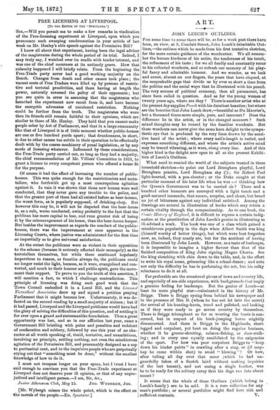ART.
JOHN LEECH'S OUTLINES.
FOR some time to come there will be, as for a week past there have been, on view, at 9, Conduit Street, John Leech's inimitable Oat- lines,—the outlines which he made from his first tentative sketches, for the more certain guidance of the woodcutter. We all remem- ber the human kindness of his satire, the tenderness of his touch, the refinement of his taste ; for we all fondly and constantly recur to his collected woodcuts, and so refresh our memory of his play- ful fancy and admirable humour. And we wonder, as we look and count, almost on our fingers, the years that have elapsed, at the unspeakable gaps that divide us by ever so short a time from the politics and the social ways that be illustrated with his pencil. The very science of political economy, then all paramount, has since been called in question. And as for the young women of twenty years ago, where are they ? There is another artist who at the present day supplies Punch with his daintiest beauties; but where are the beauties that John Leech drew,—beautiful as Du ManHer's, but a thousand times more simple, pure, and innocent? Does the difference lie in the artist, or in the changed manners ? Such mixed thoughts may be roused by the familiar woodcuts. But those woodcuts can never give the same keen delight to the sympa- thetic eye that is produced by the very lines drawn by the sensi- tive hand of the artist ; where every nail's-length is varied, and expresses something different, and where the artist's active mind may be traced vibrating, as it were, along every line. And of this higher kind is the delight now open to all at the present Exhibi- tion of Leech's Outlines.
What need to remind the world of the subjects treated in these household sketches—to point out Lord Brougham playful, Lord Brougham pensive, Lord Brougham shy 0 ; Sir Robert Peel light-hearted, with a pea-shooter ; or the Duke caught at that particular moment of his later life when he was not thinking how the Queen's Government was to be carried On ? These and a hundred other humours are conveyed with a light touch and a good-natured innuendo, that amuse, surprise, and cheer, but breed no jot of bitterness against any individual satirized. Among the drawings are several in illustration of books which may retain a certain vitality through the companionship. As to one book, the Comic History of England, it is difficult to repress a certain indig- nation at the prostitution of John Leech's genius in illustrating so ill-advised a work. The book was one of a class which gained a mischievous popularity in the days when Albert Smith was king (himself worthy of better things), but which were best forgotten now, as, indeed, they nearly are, but for the accident of having been illustrated by John Leech. However, as a taste of burlesque, it is impossible to imagine a higher flavour than that of the finished composition of King John signing Magna Charts. See the king slouching with chin down to the table, and, in the effort to write his royal name, grimacing like a school-dunce ; and note not only the difficulty he has in performing the act, but his sulky reluctance to do it at all.
Far preferable are the occasional pieces of town and country life, and especially of sea-side experiences, with backgrounds that imply a genuine feeling for landscape. But the genius of Leech—at least its more playful star—culminated in the history of Mr. Briggs. There is Briggs eyeing from behind his newspaper and in the presence of Mrs. B. (whom he has not let into the secret) the arrival of his hunting-boots, treed and polished, and looking as if they were ready to go across country by themselves. There is Briggs triumphant so far as wearing the boots is con- cerned, but in respect of his buck-jumping horse mightily disconcerted. And there is Briggs in the Highlands, short- legged and corpulent, yet bent on doing the regular business, whether it be grouse-shooting, salmon-fishing, or deer-stalk- ing; and in every case equally annihilated by the exigencies of the sport. For how was poor corpulent Briggs to " keep down his hinder pairts " in crawling after a stag, or (if may- hap he came within shot) to avoid " blowing "? Or how, after toiling all day over that moor (which he had un- guardedly taken of a Scotch laird without making inquiries of the last tenant), and not seeing a single feather, was be to be ready for the solitary covey that his dogs ran into about sunset ?
It seems that the whole of these Outlines (which belong to Leech's family) are to be sold. It is a rare collection for any man's portfolio ; or several portfolios might find here rich and


































 Previous page
Previous page